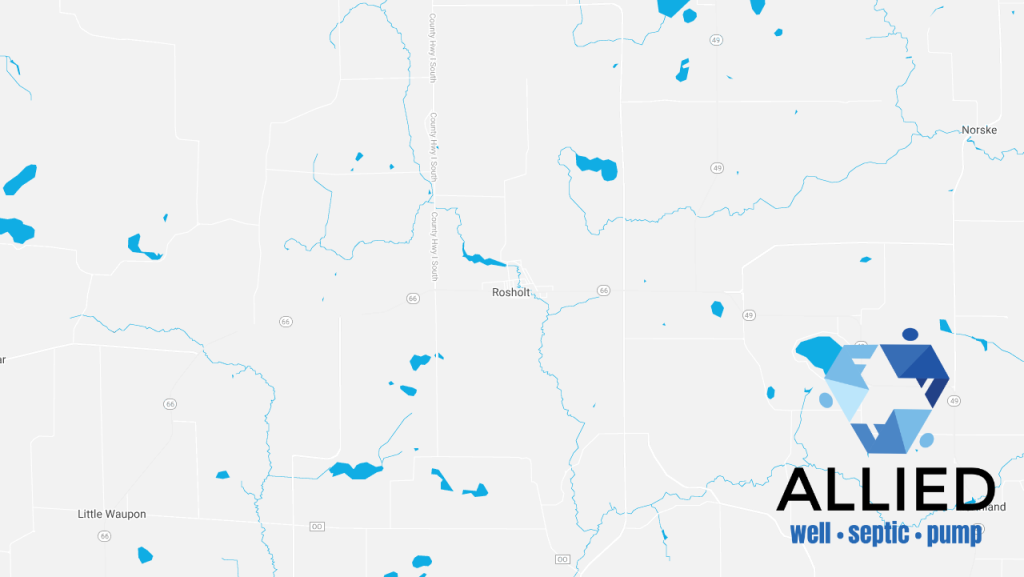We install new and replacement septic systems in Rosholt, WI. Homes and businesses in Portage county that do not have access to municipal sewer service must provide their own private waste water treatment system. Residential wastewater can contain undesirable substances such as household chemicals, disease-causing bacteria, infectious viruses, and excess nutrients such as nitrogen and phosphorus. Septic systems are designed to purify wastewater before it enters Wisconsin’s groundwater. Do you need new or replacement septic systems in Rosholt?
Do you also need a well in Rosholt, WI? Ask us about a well and septic package deal to help you save money on your project.
Pro Tip
Is your drain field overloaded, and pooling above ground? Sometimes the overloaded drain field can recover if a strict policy of water conservation is observed by the homeowner. If the soil around the piping or chambers is allowed to dry out, it may be able to function properly once again. This method requires a good deal of homeowner commitment for septic systems in Rosholt. It usually takes at least a 30% reduction in water use to allow the drain field to recover.
Septic Systems In Rosholt Area

Septic Systems – Other Areas Served
Along with septic systems in Rosholt, we also provide septic contracting services to surrounding Portage county areas, including but not limited to, Nelsonville, Almond and Amherst, WI.
Protecting Your Septic Systems In Rosholt, WI.
Following these simple guidelines and procedures can help your septic systems in Rosholt to recycle waste water properly and have a long life:
- Practice water conservation, fix leaks and drips, and install low-flow fixtures when replacing old plumbing.
- Do not overload the system. Early morning and bedtime are peak water use times. Run dishwashers and washing machines at other times of the day. Do not do all of the laundry in one day.
- Do not dispose of the following into a septic system: coarse organic matter, vegetable trimmings, coffee grounds, cigarette butts, tampons, diapers, condoms, baby wipes, etc. These will clog the septic tank with sludge and will require more frequent tank pumping. Use of a garbage disposal may shorten a drain field life. Home composting is an excellent alternative.
- Fats and grease – cooking oil, bacon grease, etc., will bypass the tank baffles and clog the drain field.
- Chemicals such as pesticides, disinfectants, motor oil, acids, medicines, paint and paint thinners, etc. will kill the good bacteria that decomposes organic matter in the tank, and cause increased sludge build up. This septic tank will become filled with high strength waste water and create anaerobic conditions in the drain field causing a Bio mat, or clogged soil.
- Avoid compacting the soil over the drain field area. Compaction may decrease the soil loading rate causing the waste water to pond on the ground surface. Do not drive vehicles or build structures over either the septic tank or drain field. These activities may cause cracks in the piping or tanks.
- Do not plant deep rooted trees or shrubs over the drain field. Deep rooted water loving plant species have roots that will plug pipes and fill tarred joints in the septic tank. These roots cause physical damage and plug the drain field.
Frequently Asked Questions
What Causes Septic Drain or Drain Field Failure?
Drain field failure can be caused by many things, including excessive rainfall, tree roots interfering with the drain lines, the disposal of decay-resistant materials or vehicles driving over the system and cracking pipes and chambers. The two most common causes are hydraulic and biological overloading.
What Is Hydraulic Overloading?
Hydraulic overloading occurs when too much water is sent to an under-designed system. The initial design of a system is based on soil and site characteristics, including depth to groundwater or bedrock. Part of the design includes the system’s capacity, which takes into account the number of people living in the home. Extra people or the addition of a water softener, for instance, can create more wastewater than the system and drain field can handle.
What Is Biological Overloading?
Biological overloading is the result of too much organic matter in the effluent. The addition of appliances, such as garbage disposals and dishwashers, can greatly change the quality of the wastewater sent to the system. These appliances send increased amounts of solids to the system, possibly causing biological overloading.
